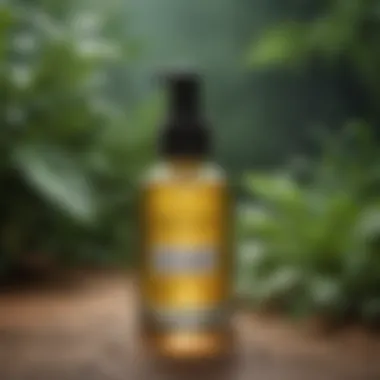Effective Treatment Options for Folliculitis on Buttocks: A Comprehensive Guide


Style Guides
Folliculitis on the buttocks is a common skin condition that can cause discomfort and irritation. It occurs when hair follicles become inflamed, leading to red bumps or pustules. Understanding how to effectively treat folliculitis on the buttocks is crucial for promoting skin health and alleviating symptoms. In this comprehensive guide, we will explore various treatment options to address this condition and improve the overall condition of the skin.
Understanding Folliculitis on the Buttocks
Before delving into treatment options, it's essential to have a clear understanding of what folliculitis entails. Folliculitis is a skin condition that occurs when hair follicles become infected or inflamed, resulting in symptoms such as redness, itchiness, and small pus-filled bumps. When folliculitis affects the buttocks area, it can cause discomfort and embarrassment for individuals. By recognizing the signs and symptoms of folliculitis on the buttocks, individuals can seek appropriate treatment to manage the condition effectively.
Identifying Symptoms of Folliculitis
Symptoms of folliculitis on the buttocks may include red, itchy bumps, pustules, or cysts. These bumps can be painful and may contain pus. In some cases, folliculitis can lead to scarring if not treated promptly. Understanding the symptoms of folliculitis is crucial for establishing an effective treatment plan and preventing further complications.
Treatment Options for Folliculitis on the Buttocks
- Topical Treatments - Topical medications such as antibacterial creams or ointments can help reduce inflammation and kill bacteria causing folliculitis.
- Warm Compress - Applying a warm compress to the affected area can help soothe discomfort and promote drainage of pus.
- Antibiotics - In severe cases of folliculitis, oral antibiotics may be prescribed to combat bacterial infection.
- Avoid Shaving - Refraining from shaving the buttocks area can reduce irritation and prevent further folliculitis flare-ups.
Precautionary Measures
To prevent recurrent episodes of folliculitis on the buttocks, individuals should maintain good hygiene practices, wear loose clothing, and avoid excessive sweating. Keeping the skin clean and dry can help reduce the risk of folliculitis flare-ups.
By following these effective treatment options and preventive measures, individuals can effectively manage folliculitis on the buttocks and promote skin health.
Introduction
In the realm of dermatology, addressing folliculitis, especially localized on the buttocks, is a critical endeavor that cannot be overlooked. The skin, being the body's largest organ, requires vigilant care to maintain health and vitality. Understanding the nuances of folliculitis and its precise impact on the buttocks region is paramount in upholding optimal skin condition. This article aims to dissect the intricacies of effective treatment options for folliculitis, shedding light on tailored interventions that can alleviate symptoms and promote holistic skin well-being.
Understanding Folliculitis
Definition of Folliculitis
Exploring the essence of folliculitis unveils a skin condition characterized by inflamed hair follicles, often triggered by bacterial or fungal overgrowth. The inflammatory response leads to discomfort and visible skin manifestations, underscoring the need for targeted therapeutic approaches. Understanding the distinct nature of folliculitis is key in devising suitable treatment strategies bespoke to each case. While the condition presents challenges, navigating through its definitions opens the pathway to effective remedies ensuring optimal skin health.


Common Causes
Unpacking the root causes of folliculitis illuminates a spectrum of triggers encompassing bacterial, fungal, or even viral origins. Factors like compromised immunity, skin trauma, or poor hygiene play pivotal roles in the development of folliculitis. Identifying these common causes equips individuals with the knowledge to proactively mitigate risks and address underlying issues contributing to follicular inflammation. By delving into the causative agents, one can tailor treatment regimens effectively, fostering a proactive approach towards alleviating symptoms and fostering skin recovery.
Symptoms
The symptoms of folliculitis manifest in various forms, ranging from red papules to pustules, often accompanied by itching or tenderness. These visible indications, coupled with potential systemic symptoms like fever or malaise, paint a comprehensive picture of the condition's impact. Recognizing these signs is crucial in diagnosing and treating folliculitis expediently, averting complications and promoting swift recovery. By honing in on these manifestations, individuals can seek timely intervention, enhancing their overall dermatologic health.
Impact on Buttocks
Influencing Factors
Uncovering the influencing factors of folliculitis on the buttocks zone unearth an interplay of elements such as friction, sweat accumulation, or bacterial colonization due to occlusive clothing choices. These intrinsic aspects contribute to the heightened susceptibility of the buttocks region to follicular inflammation, necessitating tailored interventions. Understanding these influencing factors enables individuals to adopt preventive measures, ensuring optimal skin hygiene and comfort to combat folliculitis effectively.
Symptoms Manifestation on Buttocks
The manifestation of folliculitis symptoms on the buttocks presents distinct challenges characterized by discomfort, itching, or even pain. The anatomical location accentuates these symptoms, underscoring the importance of targeted treatment options for buttock-specific folliculitis. Deconstructing these manifestations sheds light on the unique nature of buttock-related folliculitis, guiding individuals towards tailored solutions promoting skin health in this sensitive region.
Medical Treatments
When delving into the realm of addressing folliculitis on the buttocks, understanding the significance of medical treatments becomes paramount. These treatments play a crucial role in combating the inflammatory responses within the hair follicles, providing relief from discomfort and promoting the restoration of skin health. By assessing the specific elements of medical treatments, individuals can tailor their approach to effectively manage folliculitis on the buttocks. Considering the severity and persistence of folliculitis symptoms, medical treatments offer targeted interventions that go beyond surface-level remedies. This section will explore the nuances of topical and oral medications, shedding light on the benefits and considerations vital for combatting folliculitis on the buttocks.
Topical Medications
Antibacterial Creams
In the realm of effective treatment options for folliculitis on the buttocks, antibacterial creams emerge as stalwart allies. Their antimicrobial properties target the bacteria responsible for folliculitis, reducing inflammation and promoting healing. The key characteristic of antibacterial creams lies in their ability to penetrate the skin's surface, directly combating the root cause of folliculitis. As a go-to choice for many sufferers, these creams offer a practical and targeted approach to addressing folliculitis on the buttocks. While their efficacy is undeniable, users must remain cautious about potential skin sensitivities that may arise from prolonged usage. Despite this consideration, the advantages of antibacterial creams in treating buttock folliculitis cannot be overlooked.
====
Corticosteroids
Another pivotal player in the arena of medical treatments for buttock folliculitis is corticosteroids. These anti-inflammatory agents work wonders in alleviating the redness, swelling, and discomfort associated with folliculitis. The hallmark feature of corticosteroids is their rapid action in reducing inflammation, providing individuals with prompt relief from symptoms. A popular choice among dermatologists, corticosteroids offer a targeted and potent solution for buttock folliculitis management. However, it is essential to balance their benefits with potential drawbacks such as skin thinning or discoloration, making their integration into treatment plans a strategic decision for individuals grappling with this skin condition.


Oral Medications
Antibiotics
When oral interventions come into play for buttock follic…
Home Remedies
Home remedies play a vital role in this article by offering individuals accessible and natural alternatives to manage folliculitis on the buttocks. These remedies, often utilizing common household items, can help alleviate symptoms and promote skin health without the need for medical intervention. By exploring options like warm compresses and tea tree oil, individuals can take proactive steps towards addressing folliculitis effectively.
Warm Compress
Procedure and Benefits
A warm compress involves applying a cloth soaked in warm water to the affected area. This simple yet effective method helps reduce inflammation, ease discomfort, and promote drainage of the affected hair follicles. The heat from the compress dilates blood vessels, improving blood circulation and accelerating the healing process. Its soothing nature can provide relief from pain and itching associated with folliculitis. Despite its straightforward application, the benefits of a warm compress in reducing symptoms and enhancing healing make it a popular choice for managing folliculitis on the buttocks. While the warmth aids in opening up pores and facilitating the expulsion of impurities, it is essential to maintain an optimal temperature to prevent burns or skin damage. Although generally safe, improper use of a warm compress can lead to adverse effects, emphasizing the importance of correct application techniques and monitoring to ensure effectiveness and safety.
Tea Tree Oil
Application and Precautions
Tea tree oil is recognized for its natural antibacterial and anti-inflammatory properties, making it a valuable remedy for folliculitis. When applied topically to the affected area, tea tree oil helps combat bacteria, reduce inflammation, and promote healing. Its antiseptic qualities can aid in preventing secondary infections and soothing irritated skin. However, it is essential to dilute tea tree oil before application to avoid skin irritation or allergic reactions, especially for individuals with sensitive skin. The antimicrobial nature of tea tree oil can assist in targeting the underlying causes of folliculitis while promoting overall skin health. While tea tree oil offers a gentler alternative to conventional treatments, its potency requires cautious use to prevent adverse skin reactions or complications. By understanding the appropriate dilution ratios and application methods, individuals can harness the benefits of tea tree oil effectively in managing folliculitis on the buttocks for optimal results.
Preventive Measures
Preventive measures play a pivotal role in managing folliculitis on the buttocks area. By implementing proper strategies, individuals can effectively reduce the risk of recurrent infections and promote skin health. Addressing hygiene practices and clothing choices are key components in preventing folliculitis flare-ups. These measures not only target the external triggers of folliculitis but also create a hostile environment for bacterial growth. Maintaining optimal hygiene standards helps in preventing clogged pores and bacterial colonization, which are common precursors to folliculitis. Moreover, selecting appropriate clothing materials can enhance ventilation and reduce friction, further mitigating the chances of folliculitis development.
Maintaining Proper Hygiene
Effective hygiene practices are instrumental in preventing folliculitis on the buttocks. Emphasizing regular cleansing routines, especially after sweating or physical activities, can help in removing sweat, excess oils, and dirt that may lead to folliculitis. Using gentle antibacterial soaps and avoiding harsh scrubbing is crucial to prevent irritating the skin and exacerbating folliculitis symptoms. Pat-drying the skin post-cleansing and wearing clean, breathable underwear are essential steps to maintain optimal hygiene and minimize bacterial proliferation.
Cleaning Practices


Incorporating suitable cleaning practices involves using mild, fragrance-free cleansers to avoid skin irritation. Taking lukewarm showers instead of hot baths can prevent stripping the skin of its natural oils, maintaining its protective barrier. Additionally, washing the buttocks area with gentle circular motions using a soft cloth can help unclog pores and remove impurities without causing abrasions. These meticulous cleaning practices contribute to a healthy skin environment, discouraging folliculitis development.
Clothing Choices
Selecting appropriate clothing, particularly breathable fabrics, significantly influences folliculitis prevention. Opting for loose-fitting garments made from natural fabrics like cotton ensures proper air circulation, reducing moisture buildup that encourages bacterial growth. Breathable fabrics allow sweat evaporation and prevent friction against the skin, decreasing the likelihood of hair follicle inflammation. Prioritizing comfortable underwear with moisture-wicking properties is crucial, as it helps in maintaining dryness and minimizing friction, essential factors in preventing folliculitis on the buttocks.
Breathable Fabrics
Breathable fabrics such as cotton, linen, or silk promote airflow and moisture evaporation, creating an unfavorable environment for bacteria. The permeable nature of these fabrics allows the skin to breathe and regulate temperature, preventing excess humidity that could trigger folliculitis. Choosing garments that are loose and light reduces friction on the skin, preventing hair follicle irritation. However, it is important to pay attention to proper laundering of these fabrics to avoid detergent residues that may cause skin irritation. Embracing breathable fabrics as part of clothing choices is a simple yet effective strategy to inhibit folliculitis development.
Professional Interventions
Professional interventions play a pivotal role in addressing folliculitis on the buttocks effectively. When considering professional interventions, dermatologist consultation and laser therapy stand out as vital solutions for severe or recurrent cases. These interventions offer specialized care and expertise, ensuring a tailored approach to treating folliculitis.
Dermatologist Consultation
Dermatologist consultation serves as a cornerstone in managing folliculitis on the buttocks area. Through comprehensive assessments and personalized treatment plans, dermatologists analyze the underlying causes of folliculitis and recommend suitable interventions. Assessment and treatment plans are meticulously crafted to address the specific concerns of each individual, taking into account factors such as the severity of symptoms, medical history, and skin type.
Assessment and Treatment Plans
The assessment and treatment plans devised by dermatologists are instrumental in guiding the management of folliculitis. These plans involve a thorough evaluation of the affected skin, including the extent of inflammation, infection, and any contributing factors. By tailoring treatment strategies to each patient's unique needs, dermatologists ensure optimal outcomes and long-term skin health. The interactive nature of these plans allows for adjustments based on treatment response, maximizing effectiveness.
Laser Therapy
Laser therapy offers a sophisticated approach to treating folliculitis on the buttocks, particularly in cases resistant to conventional treatments. The procedure involves the targeted application of laser energy to the affected areas, effectively reducing inflammation and promoting healing. Notably, laser therapy is prized for its precision and ability to selectively target inflamed follicles, minimizing damage to surrounding tissue.
Procedure and Effectiveness
The procedure for laser therapy entails sessions conducted in a controlled clinical setting under the supervision of experienced dermatologists. During the treatment, the laser emits concentrated beams of light that penetrate the skin to eliminate bacteria and reduce inflammation. The effectiveness of laser therapy lies in its ability to destroy the causative agents of folliculitis effectively, leading to rapid symptom relief and enhanced skin condition. While the procedure may cause mild discomfort, the results often justify the temporary sensation. Laser therapy offers a valuable alternative for individuals seeking long-lasting resolution for folliculitis on the buttocks.
Conclusion
In concluding this insightful discourse on effective treatment options for folliculitis on the buttocks, it is paramount to underscore the critical significance of timely intervention in combating this skin condition. By exploring various targeted interventions, individuals can not only alleviate distressing symptoms but also foster positive skin health outcomes. Addressing folliculitis promptly is imperative to prevent potential complications and elevate the overall well-being of the skin. This elucidation serves as a comprehensive guide for individuals seeking to enhance their understanding of folliculitis management, emphasizing the pivotal role of timely treatment.
Achieving Skin Health
Importance of Timely Treatment
Undoubtedly, the cornerstone of managing folliculitis on the buttocks hinges on the crucial aspect of timely treatment. The role of timely intervention in addressing this skin ailment cannot be overstated. Ensuring prompt initiation of appropriate interventions significantly influences the effectiveness of treatment regimens and the overall prognosis. The key characteristic of timely treatment lies in its ability to mitigate the progression of folliculitis, thereby averting potential complications and discomfort. Opting for prompt treatment measures is a prudent choice for individuals navigating the nuances of folliculitis management, given its proven efficacy in curtailing the inflammatory process and promoting expedited recovery. One distinct advantage of timely treatment is its capacity to prevent recurrent bouts of folliculitis, fostering sustainable skin health in individuals grappling with this dermatological concern. Embracing the ethos of prompt intervention not only alleviates the burdens associated with folliculitis but also sets a precedent for proactive skin care practices. The timeliness of treatment offers a strategic advantage in managing folliculitis on the buttocks, underscoring its pivotal role in fostering optimal skin health outcomes within the ambit of this elucidative discourse.



